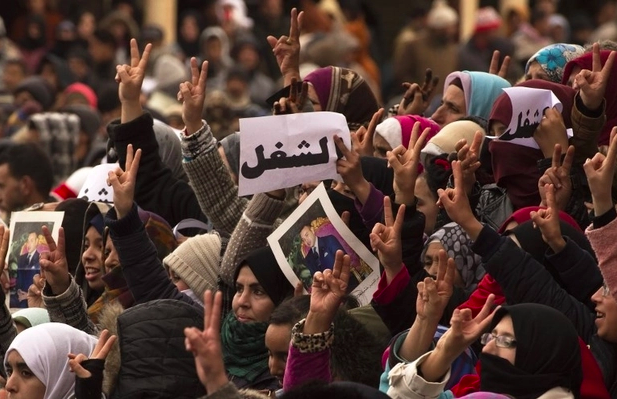Analysis
Miners’ deaths feed social protests in Morocco
Informal coal miners try to escape poverty and a spiking unemployment rate, but the work carries enormous risks.

The Jérada coal mine, located in the province with the same name in northeastern Morocco, has been officially closed since 1998. But in a region where the unemployment rate is more than double the national average (of around 10 percent), its tunnels have continued to be a vital source of income for those among the 110,000 inhabitants of the city of Jérada who dare to venture into the bowels of the site, without any arrangements to ensure their safety, to extract a little bit of coal to be resold on the black market.
More than 100 people have lost their lives this way, according to data released by the Moroccan Association for Human Rights (Association Marocaine des Droits Humains – AMDH), during the two decades of “inactivity” of what they call very appropriately the “mine of death.” The most recent victims were two young brothers, Houcine and Jedouane, aged 23 and 30, who were swept away by water in the narrow tunnel where they were working together with a friend, who managed to save himself. It happened last Friday, on Dec. 22.
Since their deaths, the people of Jérada have been taking to the streets every day, marching, determined and outraged, in front of the main public institutions, with an ever-growing number of participants. The protest that followed the death of the two brothers built on the protests of just a couple of days before, which had brought to the streets, to protest against rising food prices and the chronic lack of jobs, a social movement with wide appeal and basically non-partisan. Its rise, in turn, can be traced to the wave of protests led by the Hirak movement, which shook the entire region of the Rif mountains several times between November 2016 and July of this year, particularly the province of Al Hoceima, before the fierce repression by the Moroccan government made itself felt.
On Aug. 8, after much suffering, Attabi Imad died—the young man hit by a bullet in the head during the violent offensive by the security forces against the great demonstration that took place on the streets of Al Hoceima on July 20.
For that protest as well, the initial spark was a “workplace death,” with the workplace being non-existent and improvised. It was a case very similar to the events that, in Tunisia, led the way to the so-called “Arab Spring.” The victim, Mouhcine Fikri, was an “illegal” fishmonger, who was only trying to save his merchandise from confiscation by the authorities.
Months of non-violent protests followed, “social” in every sense, with the “Berber question” as the main theme, words which underline the urgency to create new employment and development opportunities for a historically marginalized and deprived region. Furthermore, such opportunities need to work according to a different model than that of the large solar power plant at Ain Beni Mathar, which has brought zero benefits for the local economy.
The reply from Rabat was a show of force: hundreds of activists linked to Hirak ended up in prison under serious charges, and the first sentences meant to “set an example” have already been passed. Among the condemned was Nasser Zefzafi, considered the leader of the movement, who is being held in extreme solitary confinement at the Ain Sbaa prison.
A few days after Attabi’s death, King Mohammed VI tried to hide the iron fist under the traditional Throne Day mini-amnesty, freeing those activists charged with less serious crimes, as well as the singer Silya, who had been using her remarkable popularity in the service of the Hirak movement. But the truce—if there even was one—seems to be over.
Originally published at https://ilmanifesto.it/morti-sul-lavoro-piu-nero-si-riaccende-la-protesta-sociale-in-marocco/ on 2017-12-29
